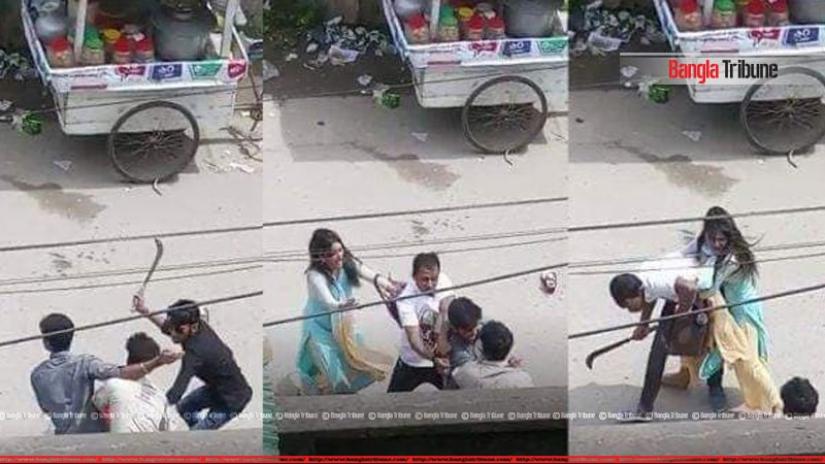 The killing of Rifat, a young man, in front of his wife, by a group of miscreants wielding machetes has opened debates on several fronts – one of which is the inactivity of the bystanders who stood there as the hacking was going on but failed to come forward to save the victim. One other facet of the crime is the attempt to find any complicity of the wife in the whole event.
The killing of Rifat, a young man, in front of his wife, by a group of miscreants wielding machetes has opened debates on several fronts – one of which is the inactivity of the bystanders who stood there as the hacking was going on but failed to come forward to save the victim. One other facet of the crime is the attempt to find any complicity of the wife in the whole event.
As the video recording of the attack shows, the wife had tried to save her husband from the attacker, Nayan Bond, and his acolytes. Then there is the third facet of the crime which deals with the moral decay of society, leaving us with a vicious mindset.
There is no doubt that the whole country is outraged by the killing in broad daylight plus the victorious frenzy in which the killers left the spot. In the social backlash that has followed, some of the interpretations are objective while others, driven more by emotion plus entrenched prejudice.
The point here is that we need to unravel each aspect of the incident as objectively as possible and then try to find the root cause to such desperate behaviour.
While the Rifat hacking was getting nationwide coverage, media reported of another hacking in Pirojpur – this time, the victim was none other than a man in uniform.
Why people do not come forward:
It’s easy to ask the question but before we point the finger at the masses who remained stunned and inactive, let’s put ourselves in a similar situation.
Just imagine, a group of young men wielding sharp weapons in broad daylight carrying out a crime. As a bystander, one will obviously feel anguished, traumatised and will want to help. But with what?
If someone has to fight off criminals who are intent on harming anyone trying to obstruct their mission, one needs at least a bamboo pole, a stick or something to fight with.
In the Borguna incident, the attackers are known thugs engaged in the drug trade.
Nayan, the main accused, has been to jail before but came out after a short time. Since the locals know him and his cronies, they are also aware that if they try to stop what they are doing, there will be reprisals.
Who would provide security to a common person acting on the human impulse to save someone from a bunch of killers?
As per reports, Nayan was a known culprit, enjoying impunity in his area. So, when people know that the criminal is living a life mocking the law, would it be right for anyone to act against such a person?
The blame should not be directed at the people who stood there and watched. If someone had a licenced weapon then possibly that person would have intervened but then, in Bangladesh, to get a valid permit to carry a weapon involves a Kafkaesque procedure.
Leave the weapon, come to basic facts of self-preservation: when an uncontrolled machete is flung about savagely, even a law enforcer would think twice before acting.
The blame lies on a social system which has allowed people like Nayon to roam free and develop a sense of invincibility.
 Did the wife have a part in the killing?
Did the wife have a part in the killing?
Soon after the death of Rifat, rumours started circulating that the wife had a clandestine relation with Nayon, the killer, and the hacking was pre-planned with the wife’s (Ayesha) consent. No evidence has surfaced so far to support this.
As the video shows, the wife tried her best to save her husband. She has also stated that the killer used to disturb her on the phone and on the road.
As things now stand, Ayesha may have had some connection with Nayan though as per her statement, she was never interested to have a relation with him.
Since there has been a killing, no possibility can be ruled out until the whole investigation is done.
Ayesha should not be vilified without proper facts and hardcore evidence, which I am certain, the police are seeking.
If she had a relationship with the killer then once Nayon is arrested, some evidence will emerge, either from him or from some other source. But until that happens and we get incontrovertible proof, she should be kept outside voyeuristic analysis that aims to proliferate cheap, sordid titillation.
The murder has all the hallmarks of a crime of passion and in such cases, anything is possible. If we have our theories, it’s best to keep them to us for the time and allow the police to unearth the actual facts.
Why have we become so violent?
On Friday night, just two days after the hacking of Rifat, a Bangla movie showing on a TV channel had a scene where the villain, wielding a ramda (indigenous machete) tied up a person who had vowed to testify against the criminal at court.
When the restrained man refused to change his court statement, the villain slaughters him with the machete and walks off. In between, he delivers catchy lines of bravado.
These scenes are rampant in movies in which, surprisingly, the hero is often portrayed as an underworld killer. A look at most Bangla films of recent times will show that almost eighty per cent have protagonists who are linked to the crime world in some way.
They drive flashy cars, carry unlicensed weapons, give threats to police, browbeat the corrupt politician and, in the end, gets the girl and her devoted love.
One may call this formula sheer escapism but this is exactly what is happening in real life. Countless criminals like Nayan are about – making swift money from their involvement in crime and the murky sides of politics.
The masses actually see such people going about with impunity, living in luxury and also getting what they want.
We have become violent because a deep social aberration has taken place insidiously. That profoundly flawed culture has made us mercenary, rapacious and grotesquely selfish.
A pervasive nexus between law, criminals and vile politicians have only created a breed of monsters like Nayan.
Reportedly, his group is called 007, and in Borguna, he is known as Nayon Bond – goes to show how popular fiction has been used/abused to add a diabolical cachet to a life of depravity.
Towheed Feroze is a news editor at Bangla Tribune and teaches at the University of Dhaka.


